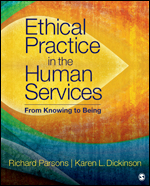Ethical Practice in the Human Services moves beyond addressing ethical issues and principles to helping readers actually practice ethical behavior through awareness of their personal morals, values, and choices. With coverage of ethical standards from six different associations, the text addresses ethical issues and principles in social work, counseling, psychology, and marriage and family therapy. Robust pedagogy includes case illustrations and guided exercises to give readers a deeper understanding of the underlying moral principles and values that serve as a foundation for the various ethical codes.
ISBN: 9781506332925
eBook
Suggested Retail Price: $52.00
Bookstore Price: $41.60
ISBN: 9781506332925
eBook
Suggested Retail Price: $58.00
Bookstore Price: $46.40
ISBN: 9781506332925
eBook
Suggested Retail Price: $65.00
Bookstore Price: $52.00
ISBN: 9781506332925
eBook
Suggested Retail Price: $94.24
Bookstore Price: $75.39
ISBN: 9781506332918
Paperback
Suggested Retail Price: $135.00
Bookstore Price: $108.00
See what’s new to this edition by selecting the Features tab on this page. Should you need additional information or have questions regarding the HEOA information provided for this title, including what is new to this edition, please email sageheoa@sagepub.com. Please include your name, contact information, and the name of the title for which you would like more information. For information on the HEOA, please go to http://ed.gov/policy/highered/leg/hea08/index.html.
For assistance with your order: Please email us at textsales@sagepub.com or connect with your SAGE representative.
SAGE
2455 Teller Road
Thousand Oaks, CA 91320
www.sagepub.com
Part One: Helping: The Role and Influence of the Helper
The Helping Process: A Blending of Art and Science
The Helping Process: The Meeting of Client and Helper
The Role of the Client in the Process of Change
The Role of the Helper in the Process of Change
Helper Values
Helper Competence: Beyond Knowledge and Skill
The Ethics of Therapeutic Choice
Professionalization, Professional Ethics, and Personal Response
Formal Ethical Standards: The Evolution of a Profession
Across the Professions: A Review of Ethical Standards of Practice
Common Concerns and Shared Values Across the Professions
Beyond Knowing - A Call to BEING Ethical
Prejudice – Pervasive In and Throughout the Helping Profession
Responding to the Challenge
Part Two: Ethics and Standards of Practice: The Professions’
The Helping Process as a Legal Contract
The Legal Foundation of Ethical Practice
When Ethics and Legalities Collide
Serving the Individual within a System
Ethical Culture of Social Systems
Who Is the Client?
Codes of Ethics – Guides not Prescriptions
Ethical Decision Making: A Range of Models
Common Elements: An Integrated Approach to Ethical Decision Making
Part Three: Applying Ethical Standards
The Rationale for Informed Consent
Informed Consent across the Profession
Special Challenges to Informing for Consent
Confidentiality: What and When Warranted?
Legal Decisions: Confidentiality and Privileged Communications
Setting and Maintaining Professional Boundaries
Professional Objectivity: Essential to Professional Boundaries
Legal Decisions
Practicing Within the Realm of Competence
Professional Development: Knowing the State of the Profession
The Standard of Care: Appropriate Treatment
Employing an Action Research Approach to Practice
The Use of Referral
Recent Legal Decisions
Monitoring and Evaluating Intervention Effects
Recent Legal Decisions
Competency to Practice
Identifying the “Client”
Informed Consent
Confidentiality
Boundaries
Responsibility: Client Welfare
Competency: More than Knowledge and Skill
Burnout
Compassion Fatigue
The Ethical Challenge
Ethical Response
Companion Website
Calling all instructors!
SAGE’s password-protected companion website includes the following text-specific Instructor resources:
- Test banks provide a diverse range of pre-written options as well as the opportunity to edit any question and/or insert personalized questions to effectively assess students’ progress and understanding
- Editable, chapter-specific PowerPoint® slides offer complete flexibility for creating a multimedia presentation for the course
KEY FEATURES:
- A unique focus on self-reflection and awareness of values, morals, and choices helps students go from simply understanding ethics to applying and practicing ethics.
- Coverage of the most recent ethical standards from associations include the American Counseling Association (ACA), the American Association for Marriage and Family Therapy (AAMFT), the American Psychological Association (APA), the American School Counselor Association (ASCA), the International Association for Group Psychotherapy and Group Processes (IAGP), and the National Association of Social Workers (NASW).
- Case illustrations in every chapter help prepare students for the many complex ethical decisions they will encounter in practice.
- Guided practice exercises help readers understand key concepts and prepare them to incorporate ethical values into their own practice.
- Built-in learning aids in every chapter, including learning objectives, concluding case illustrations, a cooperative learning exercise, and a list of web- and literature-based resources, help students master the material.

